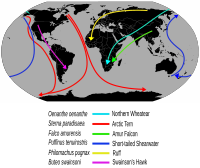
Photo from wikipedia
Human behavior profoundly affects the natural world. Migratory birds are particularly susceptible to adverse effects of human activities because the global networks of ecosystems on which birds rely are undergoing… Click to show full abstract
Human behavior profoundly affects the natural world. Migratory birds are particularly susceptible to adverse effects of human activities because the global networks of ecosystems on which birds rely are undergoing rapid change. In spite of these challenges, the blackcap (Sylvia atricapilla) is a thriving migratory species. Its recent establishment of high-latitude wintering areas in Britain and Ireland has been linked to climate change and backyard bird feeding, exemplifying the interaction between human activity and migrant ecology. To understand how anthropogenic influences shape avian movements and ecology, we marked 623 wintering blackcaps at 59 sites across Britain and Ireland and compiled a dataset of 9929 encounters. We investigated visitation behavior at garden feeding sites, inter-annual site fidelity, and movements within and across seasons. We analyzed migration tracks from 25 geolocators fitted to a subset of individuals to understand how garden behavior may impact subsequent migration and breeding. We found that blackcaps wintering in Britain and Ireland showed high site fidelity and low transience among wintering sites, in contrast to the itinerant movements characteristic of blackcaps wintering in their traditional winter range. First-winter birds showed lower site fidelity and a greater likelihood of transience than adults. Adults that frequented gardens had better body condition, smaller fat stores, longer bills, and rounder wingtips. However, blackcaps did not exclusively feed in gardens; visits were linked to harsher weather. Individuals generally stayed at garden sites until immediately before spring departure. Our results suggest that supplementary feeding is modifying blackcap winter ecology and driving morphological evolution. Supplemental feeding may have multifaceted benefits on winter survival, and these positive effects may carry over to migration and subsequent breeding. Overall, the high individual variability in blackcap movement and foraging ecology, and the flexibility it imparts, may have allowed this species to flourish during rapid environmental change.
Journal Title: Global change biology
Year Published: 2021
Link to full text (if available)
Share on Social Media: Sign Up to like & get
recommendations!